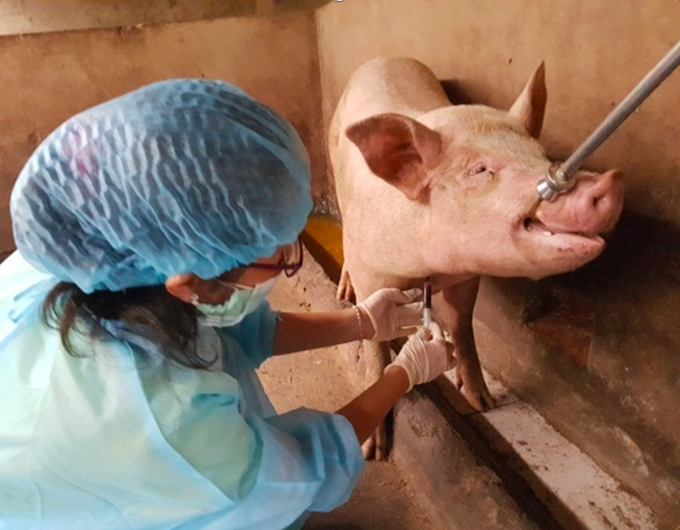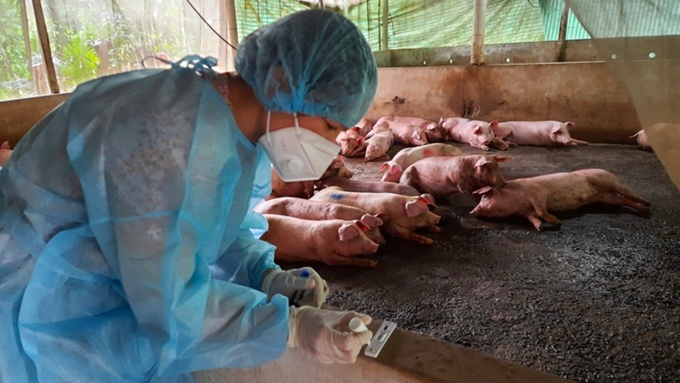
Tien Giang’s Animal Husbandry and Veterinary Department took blood samples from sick pigs. Picture: Minh Dam.
At the end of April 2019, African swine fever appeared in Tien Giang and spread rapidly, with a total of 167,000 destroyed or dead pigs with a volume of over 10,000 tons.
In 2020, the Prime Minister approved the national plan to prevent and control African swine fever by 2025, including regulations to destroy all pigs if they were infected, dead or tested positive.
During the outbreak there are still pigs that are not infected. However, most of the kept pigs are in turn destroyed by the local response team because this pig was infected with the virus. In fact, there have been many instances where the local shock team has had to visit the household more than 20 times in 60 days.
By overseeing many scientific research projects, Dr. Thai Quoc Hieu, deputy director of the subdivision of Tien Giang’s Animal Husbandry and Veterinary Department, noted that the virus appeared in the blood only when pigs had clinical symptoms, and it took sick pigs 2-3 days to shed the virus , and it takes another 1-2 days to officially excrete the virus that causes the disease. Thus, pigs infected with the disease for at least 3 days shed the disease-causing virus into the breeding environment. “These three days are what we call the ‘Golden Hour,'” said Dr. said Thai Quoc Hieu.
In order to have a basis for supporting households whose pigs are being culled due to disease, a positive test result for ASF virus by the Division of Animal Health Region VI PCR method is required. However, the results of this test usually take 2-3 days, which means that the entire “golden hour” is lost. A quick test now only takes a few hours. Therefore, in order to use the “Golden Hour” effectively, rapid test results must be used. Remarkably, 100% of the rapid virus test positive samples gave accurate results when re-implemented with the PCR method.
On this basis, Dr. Thai Quoc Hieu and the Tien Giang Department of Animal Husbandry and Veterinary Medicine proposed to the Ministry of Agriculture and Rural Development to advise the Provincial People’s Committee to issue the official letter No. 7162/UBND-KT approving the The policy of using rapid tests for prevention and control of African swine fever aims to remove infected pigs from the herd early, before potentially pathogenic viruses are shed.

Rapid test for African swine fever in the barn. Picture: Minh Dam.
On November 26, 2021, the People’s Committee of Tien Giang Province approved the policy of using rapid tests to prevent African swine fever. Since then, Tien Giang Animal Husbandry and Veterinary Sub-department has engaged numerous local authorities at all levels, grass-roots veterinary staff and breeders through online training, seminars, grass-roots practical exercises, brochures, etc. on the application of the “golden hour” in epidemic prevention.
According to statistics, from January 1 to November 25, 2021, when the initiative was not applied, there were 164 pig farm households with infected pigs in 79 hamlets of 48 communes in all districts of the province (except Tan Phu Dong- Quarter). The total number of pigs destroyed was almost 4,800 head, the weight of over 293,000 kg compared to the total herd of 5,751 head, which is 83%.
From November 26, 2021 to November 7, 2022, the entire province has 146 households raising sick pigs in 86 hamlets in 56 municipalities in the province (excluding Cai Lay city). The total number of pigs destroyed was 4,504 pigs/195,000 kg compared to the total number of 5,654 animals, accounting for almost 80%. Assuming that the culling rate of pigs is still 83% at this time, as if the initiative had not been applied, the volume of pigs culled could be 205,000 kg, with the amount of damages over 7.7 billion VND, the difference between 348 million dong . Therefore, applying the Golden Hour initiative saved VND 348 million for the state budget to support the people (excluding the cost of materials and destruction).
In terms of economic efficiency, it has reduced the number of pigs culled in households, disease transmission in hamlets and communities, and the number of culling for destruction.
The social aspect has changed farmers’ behavior in a positive direction, particularly through the application of disease-free breeding, early disease reporting and cooperation with local authorities. Regarding the environment, reducing the number of pigs culled will reduce the ecological impact.

